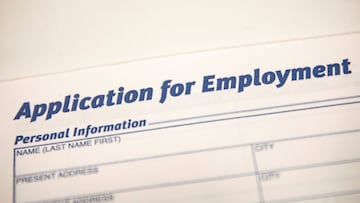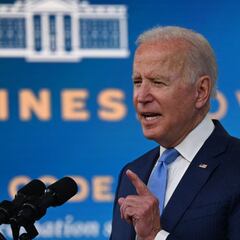Will unemployment benefits continue after Labor Day in any states?
The enhanced federal pandemic unemployment benefits will expire 6 September, removing a safety net for millions of workers collecting them. What to know...

American workers have been hard hit by the economic fallout off the covid-19 pandemic which at its height saw an unemployment rate not seen since the Great Depression. The US economy has been recovering but there are still around 5.7 million fewer jobs in July 2021 than February 2020, the month before the onset of the pandemic.
A recent report by The Century Foundation estimates that 7.5 million Americans will have all of their unemployment assistance cut when the federal pandemic programs expire on 6 September. The Biden administration is encouraging states to use stimulus finds from the American Rescue Plan for states and tribes to provide additional weeks of income assistance to those out of work.
Also see:
- What does $3.5 trillion reconciliation plan include?
- How could full FDA vaccine approval impact the economy and unemployment?
- "Modest" increases in employment seen in states that ended federal UI benefits
- What is CDC stance on face coverings in the workplace?
What pandemic unemployment programs are ending?
The CARES Act passed last year created a series of enhanced unemployment programs to provide support to Americans who were unable to work due to the pandemic and shore up state unemployment insurance programs for the long-term out of work. These included:
Pandemic Extended Unemployment Compensation (PEUC), which provided extra weeks of income support once state UI benefits had been exhausted.
Pandemic Unemployment Assistance (PUA), which provided income support to workers who are traditionally ineligible for UI, such as the self-employed and gig workers, as well as those who lost work due to covid-19.
Looking for work? Your local American Job Center can help. Visit https://t.co/WDHdRQFVHX and learn more from Secretary Marty Walsh and the @USDOL on services available to you. #support #JobSearch #AmericanJobCenter #CareerOneStop pic.twitter.com/6zplOeRG23
— CareerOneStop (@Career1Stop) August 20, 2021
Federal Pandemic Unemployment Compensation (FPUC), which originally provided $600 per week on top of other unemployment compensation, and was reduced to $300 in subsequent covid-19 relief bills.
The covid-19 relief bill passed in December 2020 created another program for mixed-earners, those who have both a wage job and are self-employed, providing an extra $100 weekly of income support.
Biden administration encourages states to continue payments to the unemployment
Payments will end on all the programs on 6 September with no federal extension coming in 27 states, three of which decided to end the at least the FPUC program but were forced to reinstate payments by judges. The PEUC, PUA and mixed-earner programs will end in another four states which had earlier ceased payments of the FPUC $300 weekly booster payments.
“The temporary $300 boost in unemployment benefits will expire on September 6th, as planned," wrote Treasury Secretary Janet Yellen and Labor Secretary Marty Walsh in a letter to Senate committee leaders Thursday.
— Mark Cavitt (@MarkCavitt) August 19, 2021
Here’s the letter: pic.twitter.com/Gf6FDqNUwS
Related stories

How could full FDA vaccine approval impact the economy and unemployment?
Treasury Secretary Janet Yellen and Labor Secretary Marty Walsh wrote in a letter that states could use stimulus funds from the American Rescue Plan to gradually wind down weekly unemployment compensation beyond the 6 September cutoff where it “makes sense based on local economic conditions.” No states have announced their intention to do so yet but Secretary Yellen and Secretary Walsh wrote “the Department of Labor will communicate to states about how they can use their existing UI infrastructure to support these state-funded benefits using American Rescue Plan funds.”
States will also have access to an additional $47 million in new CAREER grants to support reemployment services according to the letter. These funds are in addition to a $43 million grant earlier this year and $400 million of funding to support workforce development agencies and other entities to increase services to “provide a pathway back to employment” and “connect workers with good jobs.”
- Janet Yellen
- Joseph Biden
- Unemployment compensation
- Covid-19 economic crisis
- Science
- Unemployment
- Coronavirus Covid-19
- Economic crisis
- United States
- Pandemic
- Coronavirus
- Recession
- Employment
- North America
- Economic climate
- Virology
- Outbreak
- Infectious diseases
- Diseases
- Microbiology
- America
- Medicine
- Work
- Economy
- Biology
- Life sciences

